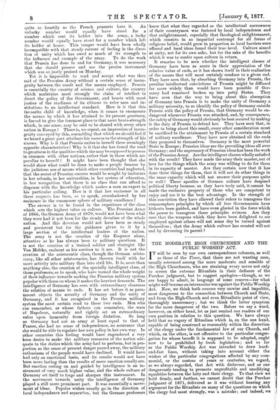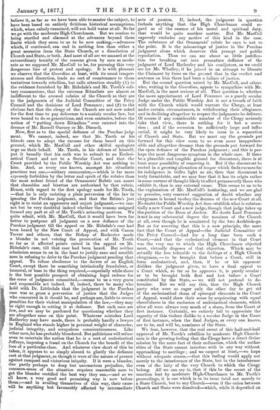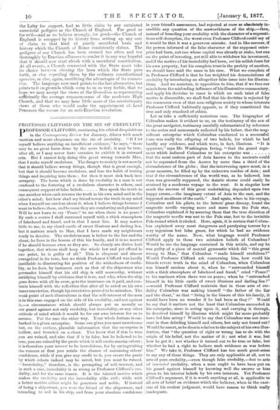THE MODERATE HIGH CHURCHMEN AND THE PUBLIC WORSHIP ACT.
IT will be seen by our own correspondence columns, as well as those of the Times, that there are not wanting men, usually esteemed among the more moderate and sensible of the High Churchmen, who are straining every nerve not only to screen the extreme Ritualists in their defiance of the Purchas judgment, but to suggest apologies—though, as we are happy to admit, in language of some reserve—for what might well become an internecine war against the Public Worship Act. Now, we think both courses very unwise and impolitic, most dangerous to the connection between Church and State, and from the High-Church and even Ritualistic point of view, thoroughly unnecessary ; but we think the latter symptom far the more dangerous of the two. Before we say a word, however, on either head, let us just remind our readers of our own position in relation to this question. We have always held that no vagary of Ritualism which is, on the one hand, capable of being construed as reasonably within the discretion of the clergy under the fundamental law of our Church, and which, on the other, is not offensive to the particular congre- gation for whose benefit it is supposed to be adopted, ought now to be prohibited by fresh legislation ; and so far as the Public Worship Act was intended to draw hard- and-f ast lines, without taking into account either the wishes of the particular congregations affected by any cere- monial, or the custom of years or centuries, we regard, as we always regarded, that Act with disfavour, and as one dangerously tending to promote unprofitable and unedifying squabbles between the laity and their clergy. To that view we hold firmly, and further, we cannot doubt that the Purchas judgment of 1871, delivered as it was without hearing any argument for the Ritualists on many of the questions on which the clergy feel most strongly, was a mistake; and indeed, we
believe it, as far as we have been able to master the subject, to have been based on entirely fictitious historical assumptions, which, when calmly examined, will not hold water at all. So far we go with the moderate High Churchmen. But we confess to being startled and alarmed at the advances beyond these limits which they seem to us to be now making,—advances which, if continued, can end in nothing less than either a great secession from the State Church, or a dissolution of Church and State, or both. And most of all are we amazed at the extraordinary tenuity of the reasons given by men as mode- rate as we supposed Mr. MacColl to be, for pursuing this very dangerous line of protest and apology. It is with pleasure we observe that the Guardian at least, with its usual temper- ateness and discretion, lends no sort of countenance to these tentatives towards rebellion, but calls attention steadily (1) to the evidence furnished by Mr. Ridsdale's and Mr. Tooth's soli- tary communions, that the extreme Ritualists are almost as indifferent to the avowed rubrics of the Church as they are to the judgments of the Judicial Committee of the Privy Council and the decisions of Lord Penzance ; and (2) to the obvious fact that the clergy of the Church are not now asked for the first time to pay deference to a mainly secular law, but were bound to do so generations, and even centuries, before the notion of "putting down Ritualism" ever entered into the dreams of Mr. Russell Gurney or Mr. Disraeli.
Now, first as to the special defiance of the Purchas judg- ment. We cannot, indeed, see that Mr. Tooth or his friends care to adopt the excuses for them based on this ground, which Mr. MacColl and other skilful apologists urge on their behalf. Mr. Tooth, in his defence of himself, put it broadly that his oath was to submit to an Ecclesi- astical Court and not to a Secular Court, and that the Court provided by the Public Worship Act was nothing to him. And, as every one knows, amongst his ritualistic practices was one,—solitary communion,—which is far more expresely forbidden by the letter and spirit of the rubrics than the most ardent friend of the Ornaments' Rubric can assert that chasubles and birettas are authorised by that rubric. Hence, with regard to the first apology made for Mr. Tooth, —that he is only resisting a plain perversion of the law in ignoring the Purchas judgment, and that the Briton's just right is to resist an oppressive and unjust judgment,—we can- not but be very doubtful indeed whether the reasons assigned formed any part at all of Mr. Tooth's actuating motives. We quite admit, with Mr. MacColl, that it would have been far better to postpone all judgment on a new defiance of the Purchas judgment till the appeal on Mr. Ridsdale's case had been heard by the New Court of Appeal, and with Canon Trevor and others, that the Bishop of Rochester made a blunder in not vetoing the prosecution of Mr. Tooth so far as it affected points raised in the appeal on Mr. Ridsdale's case, till that case had been heard. But neither admission seems to us in the least to justify sane and sensible men in refusing to defer to the Purchas judgment pending that appeal. To refuse obedience to the decree of an English Court, except there be something intrinsically fraudulent, or immoral, or base in the thing required,—especially while there is the best possible prospect of obtaining legal redress for the error of judgment committed,—seems to us a very grave and responsible act indeed. If, indeed, there be many who hold with Dr. Littledale that the judgment in the Purchas case was so gross a perversion of justice that the Judges who concurred in it should be, and perhaps are, liable to severe penalties for their violent manipulation of the law,—they may be right enough in setting it at defiance. But such men are few, and we may be pardoned for questioning whether they are altogether sane on this point. Whatever mistakes Lord Hatherley may have made, there is probably hardly a lawyer England who stands higher in personal weight of character, judicial integrity, and scrupulous conscientiousness. Like other men, he has probably blundered. But politicians will refuse even to entertain the notion that he is a sort of ecclesiastical Jeffreys, imposing a fraud on the Church for the benefit of the foes of a particular class. And whatever view short of this be taken, it appears to us simply absurd to glorify the defiance cast at that judgment, as though it were of the nature of protest against rampant and victorious iniquity. If it were a blunder, due partly perhaps to deep but unconscious prejudice, the common-sense of the situation requires reasonable men to get the blunder rectified the best way they can,—and as we all know, a very good and promising way is now before them ;—and in availing themselves of this way, their cause WM be anything but favourably affected by intermediate acts of passion. If, indeed, the judgment in question forbade anything that the High Churchman could re- gard as of the essence of his moral and spiritual duty, that would be quite another matter. But Mr. Ma,cColl expressly excludes any motive of this kind in the case. The substance of the Ornaments' rubric he says is not to the point. It is the miscarriage of justice in the Purchas judgment alone which deserves this prompt and public repudiation. Thus we can see about as little justifica- tion for breaking out into premature defiance of the judgment of Lord Hatherley and his coadjutors, as we could see for Mr. Whalley, if he joined in an attempt to liberate the Claimant by force on the ground that in the verdict and sentence on him there had been a failure of justice.
But the second question raised by Mr. MacColl, and others who, writing in the Guardian, appear to sympathise with Mr. MacColl, is the most serious of all. That question is, whether the mere appointment of Lord Penzance as a purely secular Judge .under the Public Worship Act is not a breach of faith with the Church which would warrant the Clergy, at least under certain circumstances, in withdrawing their allegiance, and in declining altogether to respect the judgments he delivers. Of course if any considerable number of the Clergy seriously take that view, there is nothing for it but a seces- sion; and if the secession be sufficiently large and influ- ential, it might be very likely to issue in a separation of Church and State. But we must say the grounds put forward for this view seem to us even more inapprehen- sible and altogether dreamy than the grounds put forward for the open defiance of the Purchas judgment ; and this is per- haps the most dangerous symptom in the whole case. If there be a plausible and tangible ground for discontent, there is at least some possibility of removing it. But if the discontent be rooted in a growing alienation of temper which finds excuses for its indulgence in trifles light as air, then that discontent is truly formidable, and we may fear that it has its origin rather in some current of thought likely to affect permanently those who exhibit it, than in any external cause. This seems to us to be the explanation of Mr. MacColl's hesitating, and we are glad to perceive, very reserved suggestion of doubt whether any clergyman is bound to obey the decrees of the new Court at all. No doubt the Public Worship Act does establish what is substan- tially a new Court and a new judge, though that judge takes up the position of the Dean of Arches. No doubt Lord Penzance is not in any substantial degree the nominee of the Church at all, even though he is nominated by the two Archbishops. But as for asserting that this is a new principle, the mere fact that the Court of Appeal—the Judicial Committee of the Privy Council—had for a long time been such a Court,—and that the ecclesiastical element in that Court was the very one to which the High Churchmen objected most, virtually disposes of that objection. Which may be actually the less tolerable to the feelings of a High Church clergyman,—to be brought first before a Court, still in form ecclesiastical, and, then, if he or his opponent dislikes the judgment given, to have a final appeal to a Court which, so far as he approves it, is purely secular ; or to be brought both first and last before a Court constituted by the State, — we will not pretend to de- termine. But we will say this, that the High Church party who were so eager only the other day to get rid of the ecclesiastical sham of episcopal elements in the Court of Appeal, would show their sense by acquiescing with equal cheerfulness in the exclusion of ecclesiastical elements, which after all were always very much of a sham, from the Court of first instance. Certainly, we entirely fail to appreciate the sagacity of this violent dislike to a secular Judge in the Court of first instance, when the final Judges, as every one knows, are to be, and will be, nominees of the State.
We fear, however, that the real secret of this half-and-half approval of Mr. Tooth's rebellion by moderate High Church- men is the growing feeling that the Clergy have a direct divine mission by the mere fact of their ordination, which the autho- rities of the State cannot interfere with in any way without approaching to sacrilege ; and we suspect at least,—we hope without adequate reason,—that this feeling would apply not merely to the interference of the State, but to the interference even of the laity of the very Church to which the Clergy belong. All we can say is, that if this be the secret of the sanction lent by moderate High-Churchmen to Mr. Tooth's proceedings, it is one which is in its issue fatal not merely to a State Church, but to any Church—even if the union between Church and State were dissolved—which, while it depedded on the Laity for support, had so little claim to any untainted sacerdotal pedigree as the Church of England. For good or forevil—and as we believe strongly, for good—the Church of England is estopped by its history from setting up any sort of claim to that kind of purely sacerdotal basis and history which the Church of Rome consistently claims. The pedigree of our Church has been crossed too often and too thoroughly by Erastian alliances to render it in any way hopeful that it should now start afresh with a sacerdotal constitution. At all events, a Church connected with the State must take its choice between obeying the laws which the State puts forth, or else repealing them by the ordinary constitutional agencies, or else, again, sacrificing the advantages of its connec- tion. The language now used points to the last alternative, but points to it on grounds which seem to us so very feeble, that we hope we may accept the views of the Guardian as representing sufficiently the average common-sense of the moderate High Church, and that we may hear little more of the revolutionary views of those who would make the appointment of. Lord Penzance the excuse for an anti-Erastian revolution.











































 Previous page
Previous page